What Animals Live In North America?
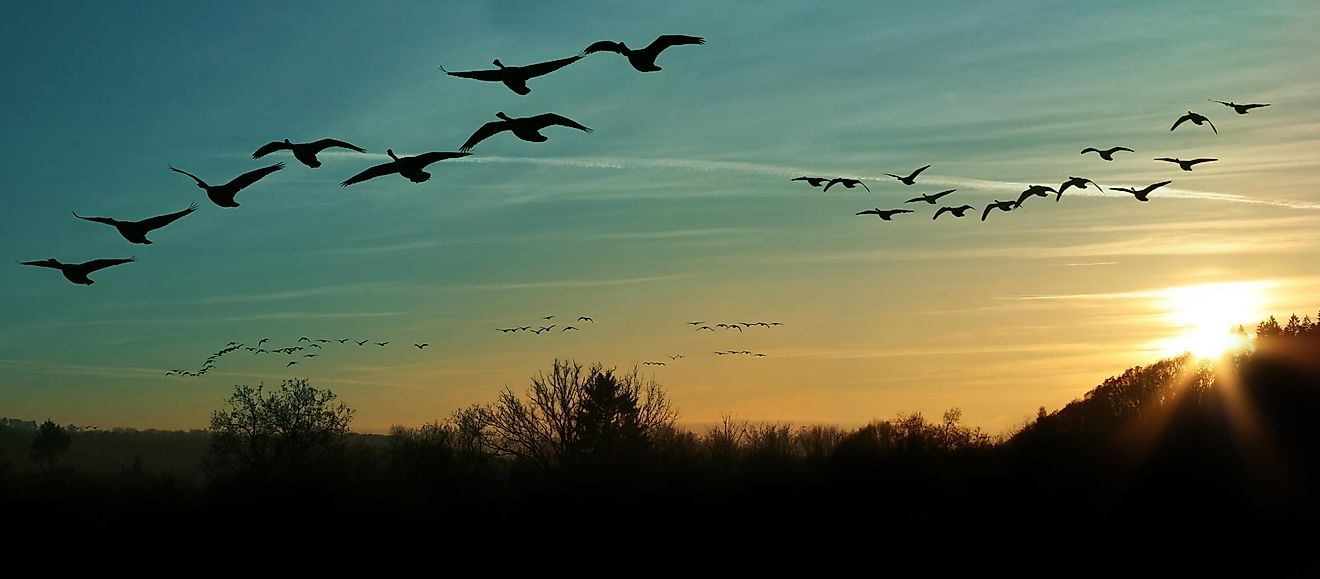
- North America is home to over 457 species of mammals, 914 birds, 662 reptiles, more than 300 amphibians and 4,000 known arachnids.
- The jaguar is the largest species of big cat in North America.
- Bald eagles are no longer considered endangered because of environmental efforts like banning the toxic pesticide DDT.
North America has a diverse array of wildlife species and is home to an estimated 457 mammals (e.g. bison, raccoons, mountain lions, beavers, moose, and jaguars), 914 birds (e.g. Bald eagles, Canada geese) 662 reptiles (e.g. alligator) more than 300 amphibians and 4,000 known arachnids (e.g bark scorpions). North America includes the United States, Canada, Mexico, and Greenland, each laden with diverse ecological systems that sustain these unique animal species.
1. Arizona Bark Scorpion
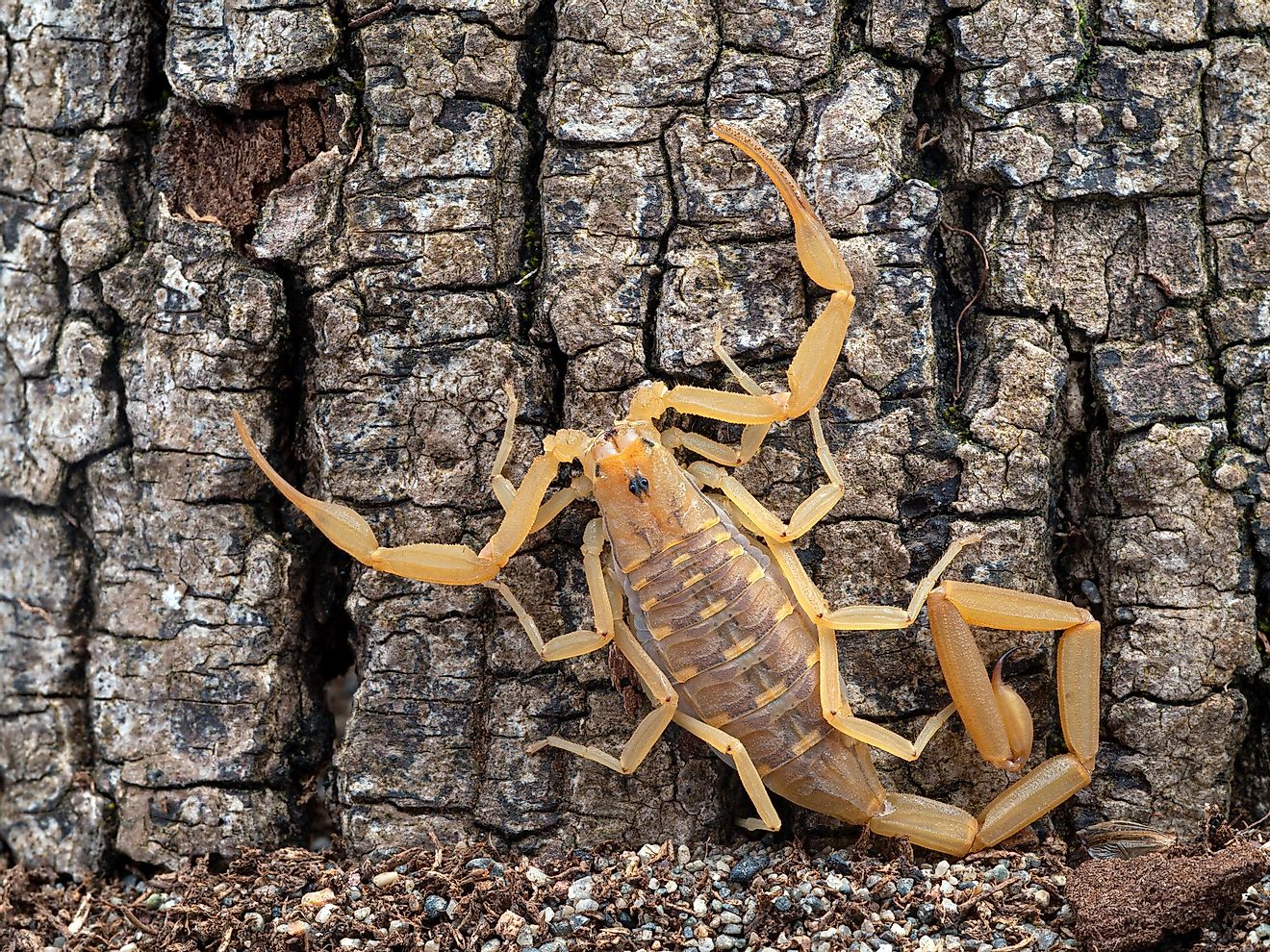
A mature Arizona bark scorpion is about 3 inches long (7.6 centimetres). Its coat is light brown or yellowish brown in color, enabling it to blend well in the desert. Arizona bark scorpions have two fore-claws and one rear claw, and a compact body with four pairs of legs. Unlike other scorpions that lead solitary lifestyles, Arizona bark scorpions live in packs and are only aggressive when threatened. The body of the animal is covered by an exoskeleton which it sheds by molting.
The hot sand of the Sonoran Desert is the ideal habitat for Arizona bark scorpions. It ambushes its prey by hiding in burrows it digs or behind the rocks. The Arizona bark scorpion stings its prey from behind, paralyzing it with venom. This scorpion's main diet consist of crickets, cockroaches, and beetles. Its venom is dangerous to children and the elderly, and can kill if the bitten person is not treated quickly. The Arizona bark scorpion matures and begins to mate at one year, and its average lifespan is six years.
2. Jaguar
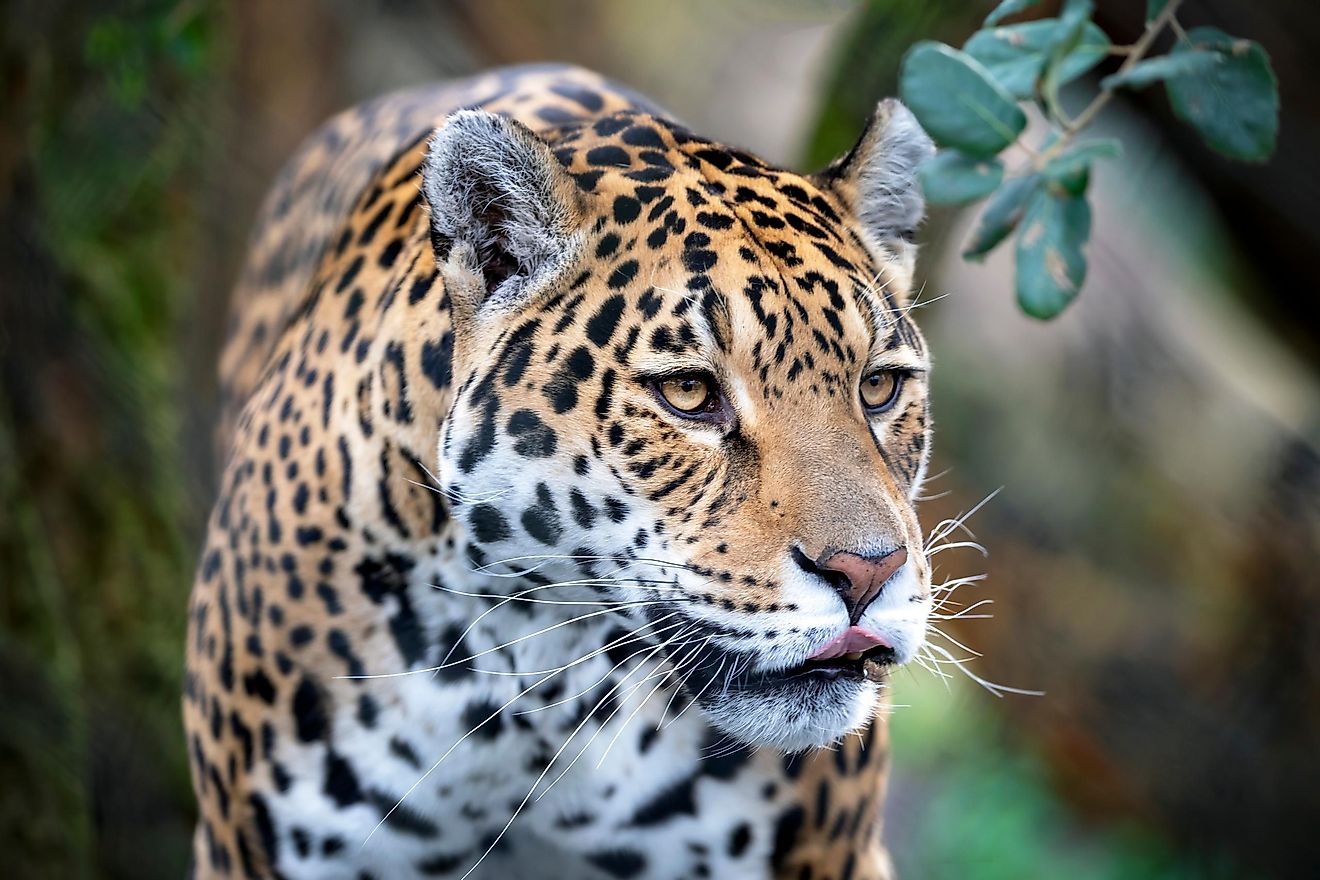
The jaguar is the largest cat in the Americas, and third largest cat in the world after lions and tigers. Its fur is yellow and tan, but may vary from reddish brown to black. Jaguar spots are solid and black on the head and neck, but larger and rose-shaped on the sides and back of the body. Its weight is between 100 and 250 pounds (45 to 113 kg), but males are heavier. The jaguar’s height to the shoulders is 25 to 30 inches (63.5 to 76 cm), and its length to the tail is between 34 and 75 inches (86 to 29.5 cm). Except when mating, jaguars lead a solitary lifestyle in a territory marked with its waste or claw marks on trees. A jaguar largely hunts on the ground, but occasionally climbs trees to get its prey. Its prey consists of deer, capybara, peccary, tapir, and since it’s a good swimmer, it also eats fish, turtles and caiman alligators.
Today, much of the jaguar population is in South and Central America as its numbers have diminished in the United States. These regions habitat have deciduous and rain forests, swamps, pampas grasslands, and mountain scrub areas. Worldwide only 15,000 of these jaguars remain, and they are classified as near threatened with a decreasing population on the IUCN Red List of Threatened Species. A jaguar’s lifespan is between 12 and 15 years in the wild.
3. Canada Goose
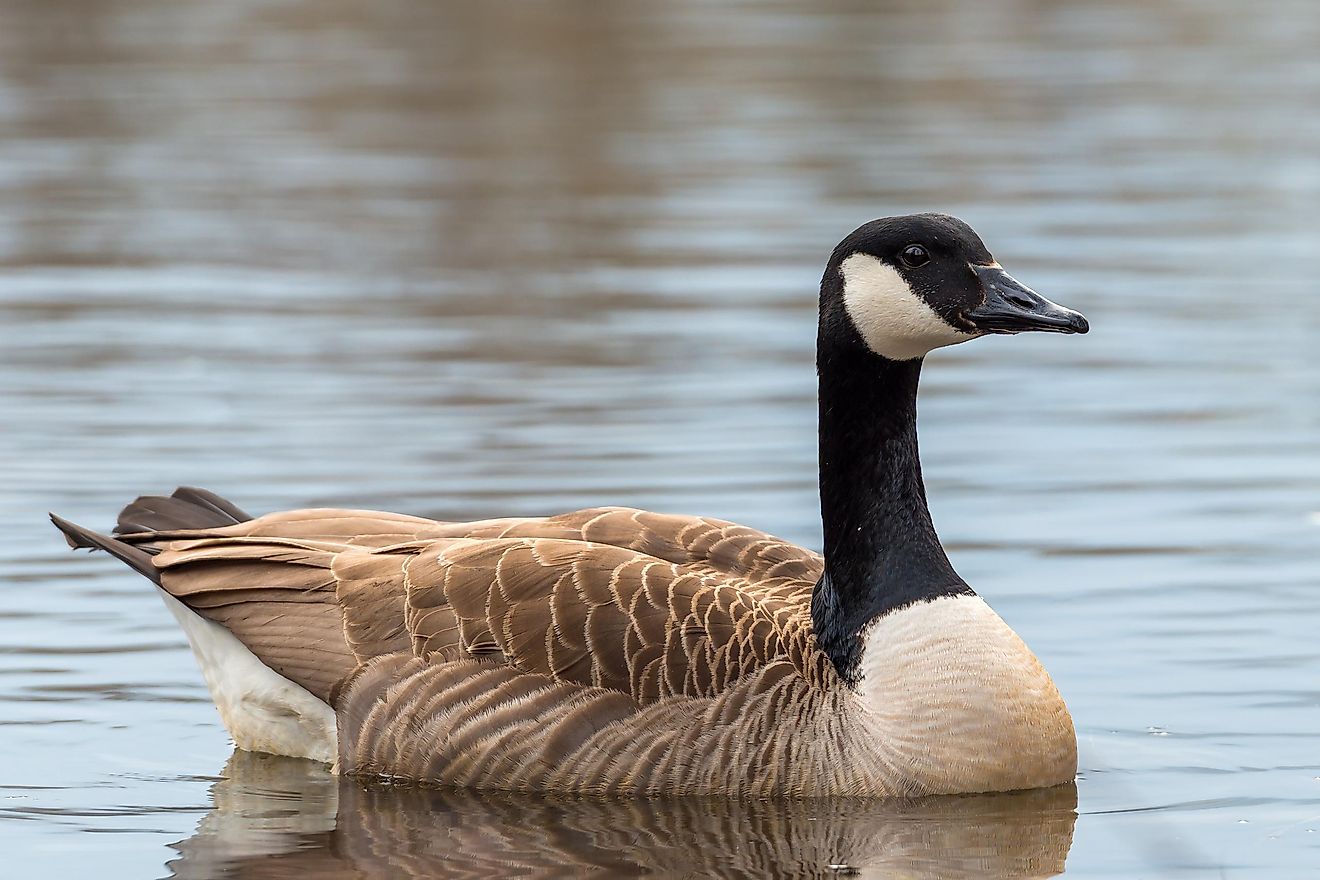
The Canada Goose has a unique black head and neck, with a white patch on the throat. Its body size is between 30 and 43 inches (76 to 109 cm), with a wingspan of between 4.2 and 5.6 feet (1.3 to 1.7 m). The weight is between 6.6 and 19.8 pounds (3 to 9 kg). It is spread all over North America, and is adaptable to multiple habitats as long as they have grasses, grains or berries to feed on. But, its choice habitat is anywhere with lakes, rivers, ponds, farms, and even park lawns.
Canadian geese live in flocks that are noisy and rowdy, and are a known nuisance to humans in public places like parks, golf courses, and cities. This herbivorous bird achieves sexual maturity at two years, and its average lifespan in the wild of 24 years.
4. Eastern Moose
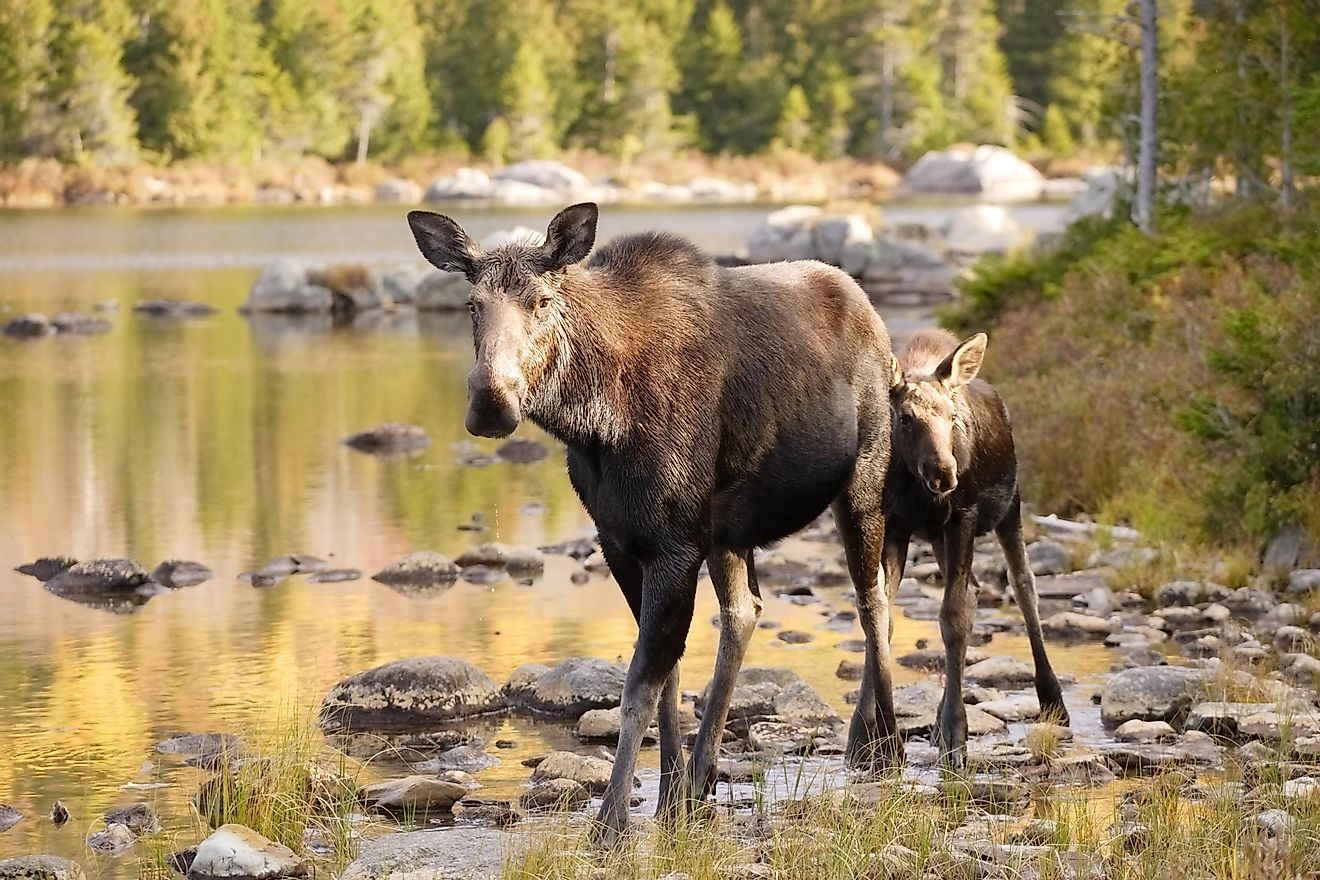
The eastern moose is the largest member of the deer family and is one of four subspecoes in North America. Its fur is brownish to brown black to grey in color. The neck and the tail are short, ears long, and its torso is compact and sturdy. The eastern moose also has a dewlap under its throat, and antlers with length of about 55 to 65 inches (139 to 165 cm) for bulls. A mature female weighs about 836 pounds (379 kg) and a bull 1,106 pounds (502 kg). An eastern moose is about 9 feet long (2.7 m) with a height to the shoulder of around 6 feet (1.8 m).
Its choice habitat is boreal and mixed wood forests, shrub lands, and wetlands. That’s because the eastern moose feeds on twigs, stems, and foliage of young deciduous trees and shrubs. Females mature to reproduce at 3.5 years and bulls at 5.5. The eastern moose is a solitary animal except when mating, or a female caring for young ones. Eastern moose populations are in Newfoundland, Nova Scotia and Northern Ontario in Canada.
5. North American Beaver
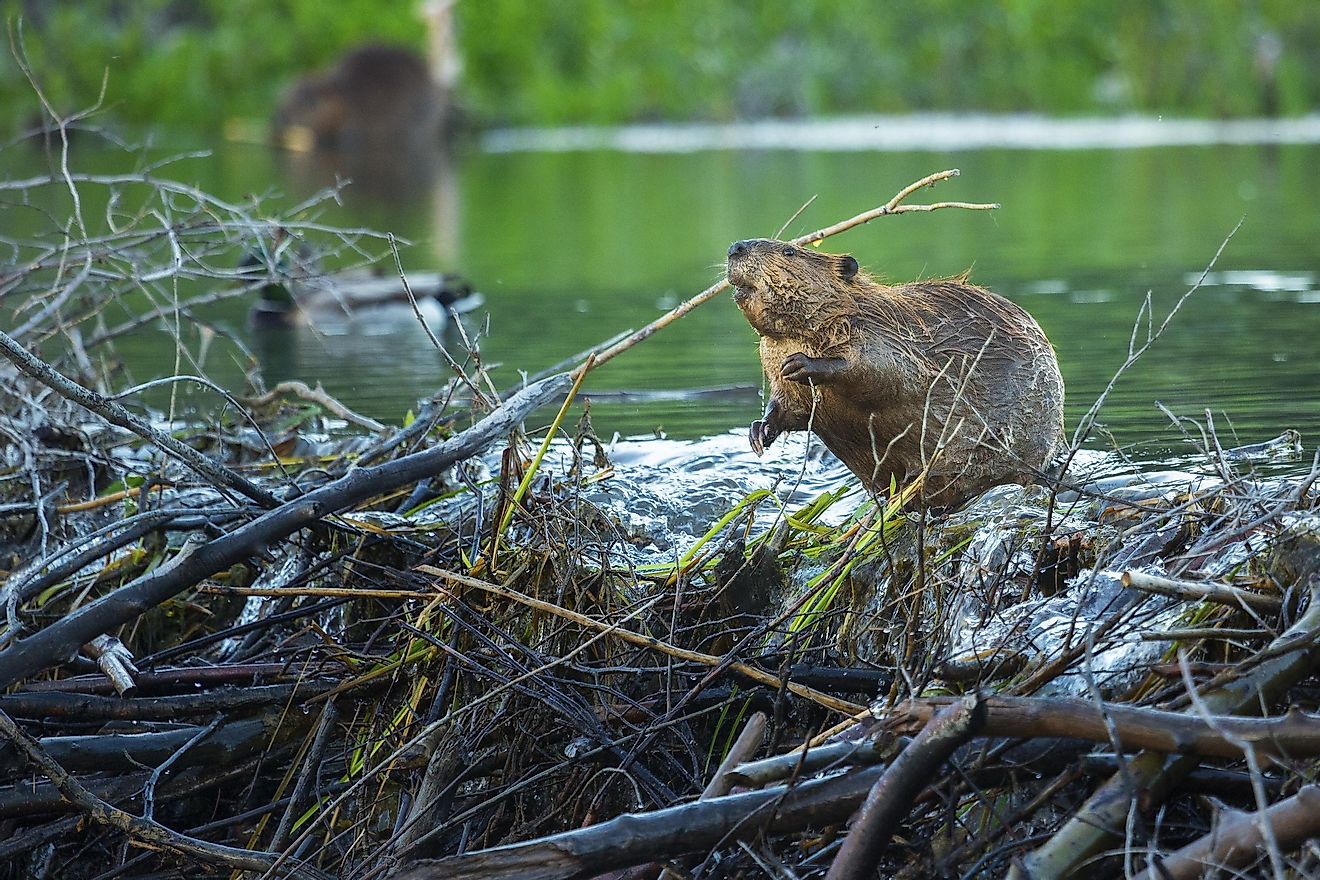
The North American beaver is a rodent that’s 45 inches long (120 cm) and weighs from 35 to around 70 pounds. It is the largest of all North American rodents. North American beavers have rough grey-brown fur, a long tail, and four pronounced brown incisors. Its short forefeet are clawed to facilitate digging of burrows and handling of food. Using its webbed hind feet and rudder-like scaly tail, the North American Beaver can swim and dive into the water.
Its diet consists of leaves, bark, twigs, roots and water plants. A North American beaver is active during winter, and swims and forages in ponds even in icy conditions. Its ideal habitat is wetlands like streams, ponds and lakes where food is available. The North American Beaver creates its own habitat when conditions are unsuitable: it builds dams by felling trees with its powerful jaws and creates mud structures to block streams. This way, it creates ponds in forests to live and raise their young.
6. American Bison
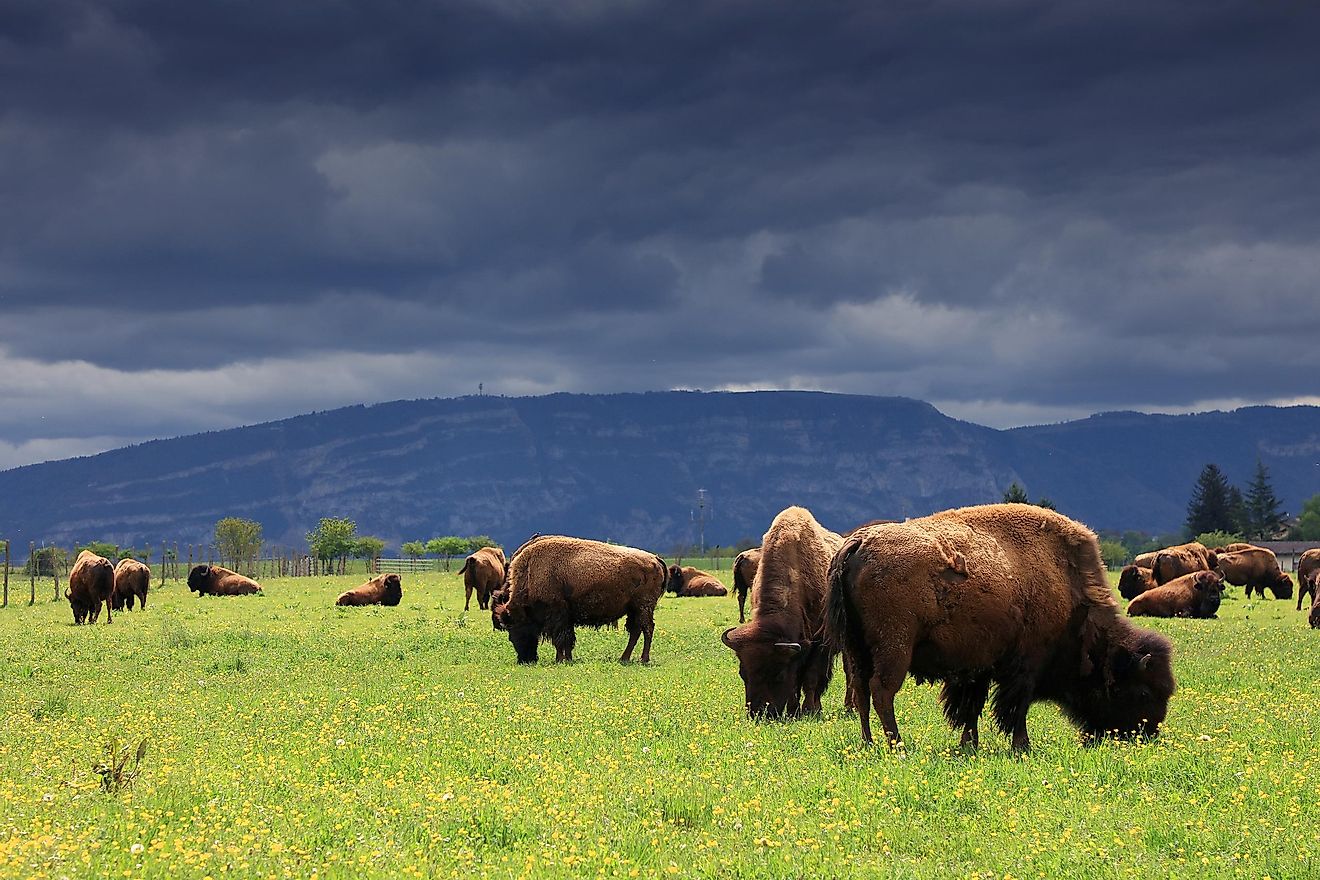
The largest mammal in North America is the American Bison. Its height to shoulders is 4.9 to 6.5 feet (1.5 to 2 m), and its length from head to rump is 7 to 11.5 feet (2.1 to 3.5 m). The American bison weighs 930 to 2,200 pounds (422 to 998 kg). It has a shoulder hump with a short, sturdy neck, and a large head with upwardly curving horns. The top of the head is covered by rugged erect black fur, and below the lower jaw is a black beard. The American bison’s shoulders and forelegs have a brownish-black fur coat, and its underbelly has long black fur.
Its natural habitat in the United States is laden with grasslands, meadows, and boreal forests in states like Montana and Colorado. These have plain grasses, herbs, shrubs, and twigs the American bison feeds on. It can run up to speeds of 37 miles (60 km) per hour in spite of its bulky shape, and it is a social animal that lives in herds. American bison achieve sexual maturity at between the ages of 2 and 4 years old, and its average lifespan in the wild is 12 to 20 years.
7. American Alligator
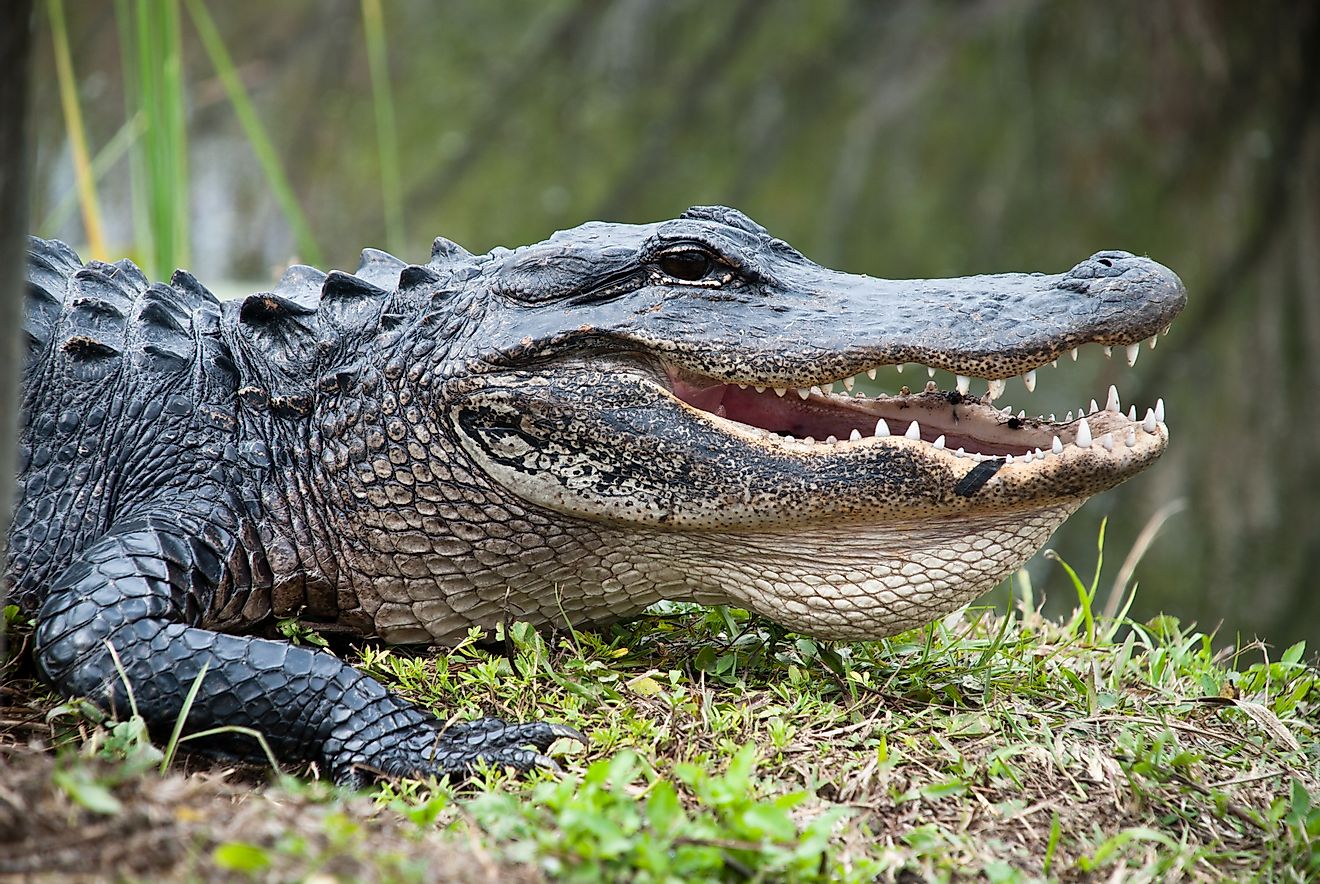
As North America’s largest reptile, the American alligator spans between 9.8 and 15 feet (3 to 4.6 m) and weighs about 1,000 pounds (453.6 km). It is distinguished from the crocodile by its rounded snout, and when its jaws close no teeth are visible, unlike the crocodile. American alligators live in freshwater habitats like lakes, rivers, ponds, swamps, and marshes dotting southeastern US, in states like Florida, southern Texas, and Louisiana.
Its body is black dotted with specks of olive brown and has thick scales, a powerful tail, strong limbs, and webbed toes that enable it to swim. The American alligator's diet comprises of fish, turtles, snakes, small mammals, decaying flesh, and even humans. Large males are territorial and solitary, but smaller alligators live closer together. It achieves sexual maturity at about 6 feet (1.8 m), achieved at 10 to 12 years, and their lifespan in the wild is between 35 and 50 years.
8. Mountain Lion
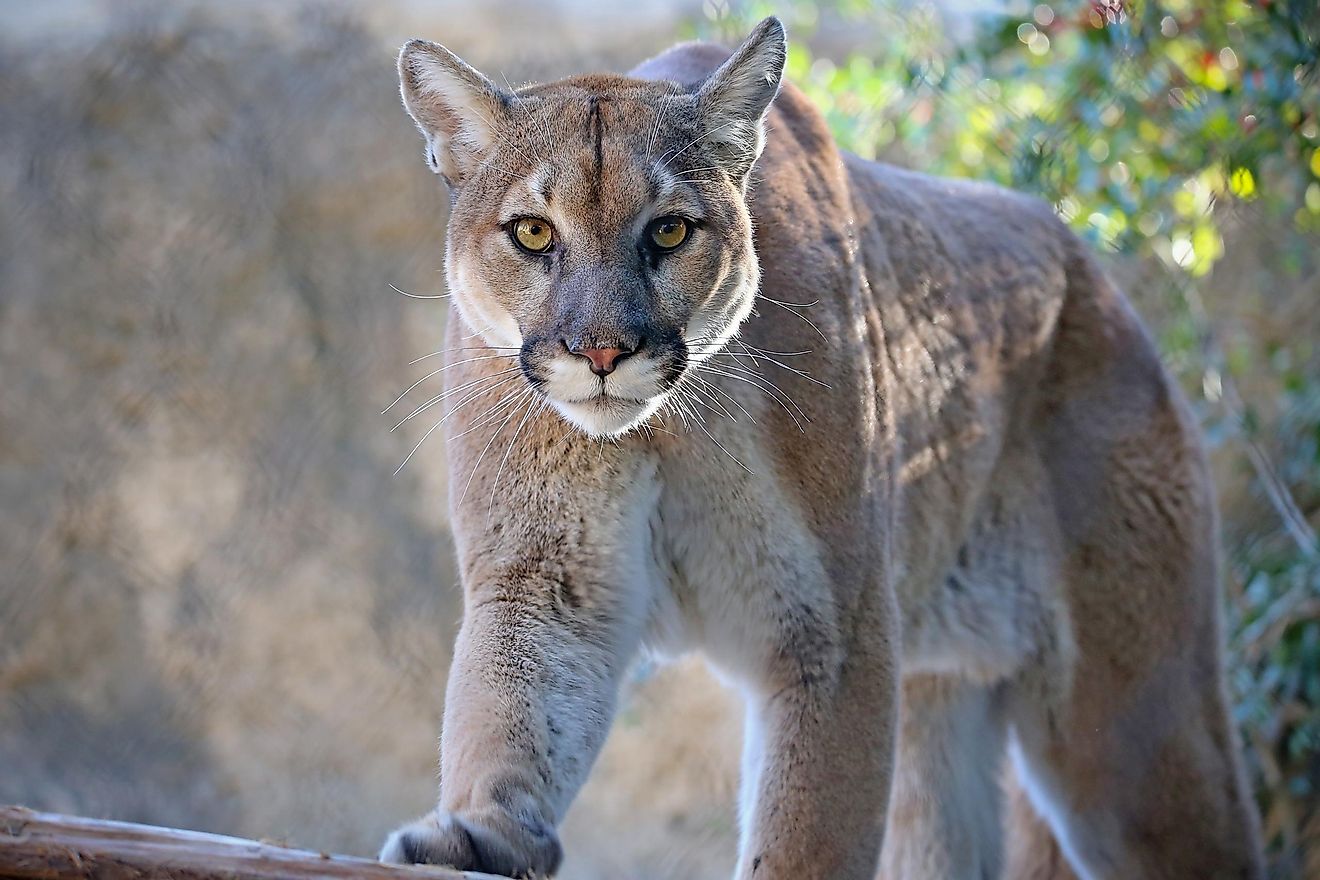
Alternatively known as a cougar, puma, or panther, the mountain lion is a solitary and reclusive carnivore and a member of the largest cat family in North America. Its height at the shoulders is between 2 and 2.3 feet (0.6 to 0.7 m) and its length 11.5 to 18 feet (3.5 to 5.5 m) with its tail. It weighs from 110 to 180 pounds (50 to 81.5 kg), and females weigh less than males.
In North America, the mountain lion is found in British Columbia and South Alberta in Canada, California, Texas, east of the Mississippi river, Florida, and Washington in the United States. This large cat feeds on deer, mice, squirrels, porcupines, raccoons, rabbits, mountain goats, elk and beavers. The mountain lion is territorial when mating, and females will often mate with more than one male. Females achieve sexual maturity at 2.5 years and males at 3 years. In the wild, they can live for 12 years and in captivity 25 years.
9. Raccoon

A raccoon is a highly adapted omnivore native to North America. It weighs from 4 to 23 pounds (1.8 to 10 kg), and its length is 23.6 to 37 inches (60 to 95 cm). A raccoon’s common fur color is gray and brown, but others are red, black, golden, white or albino. It lives in forests, marshes, prairies and urban areas.
In its natural habitat, it preys on aquatic fauna like crayfish and frogs, but it also eats mice, insects, eggs, fruits, berries, and corn, making it an opportunistic feeder. In urban areas, raccoons vandalize garbage cans in search of easy food. During winter, they estivate (sleep for extended periods) instead of hibernating, and use fat stored in their tails to stay warm. A raccoon is fairly social, contrary to common beliefs, and they cluster together in nurseries. Female raccoons reach sexual maturity at 10 months and males in their second year. In the wild, they have an average lifespan of 2 to 3 years.
10. Bald Eagle
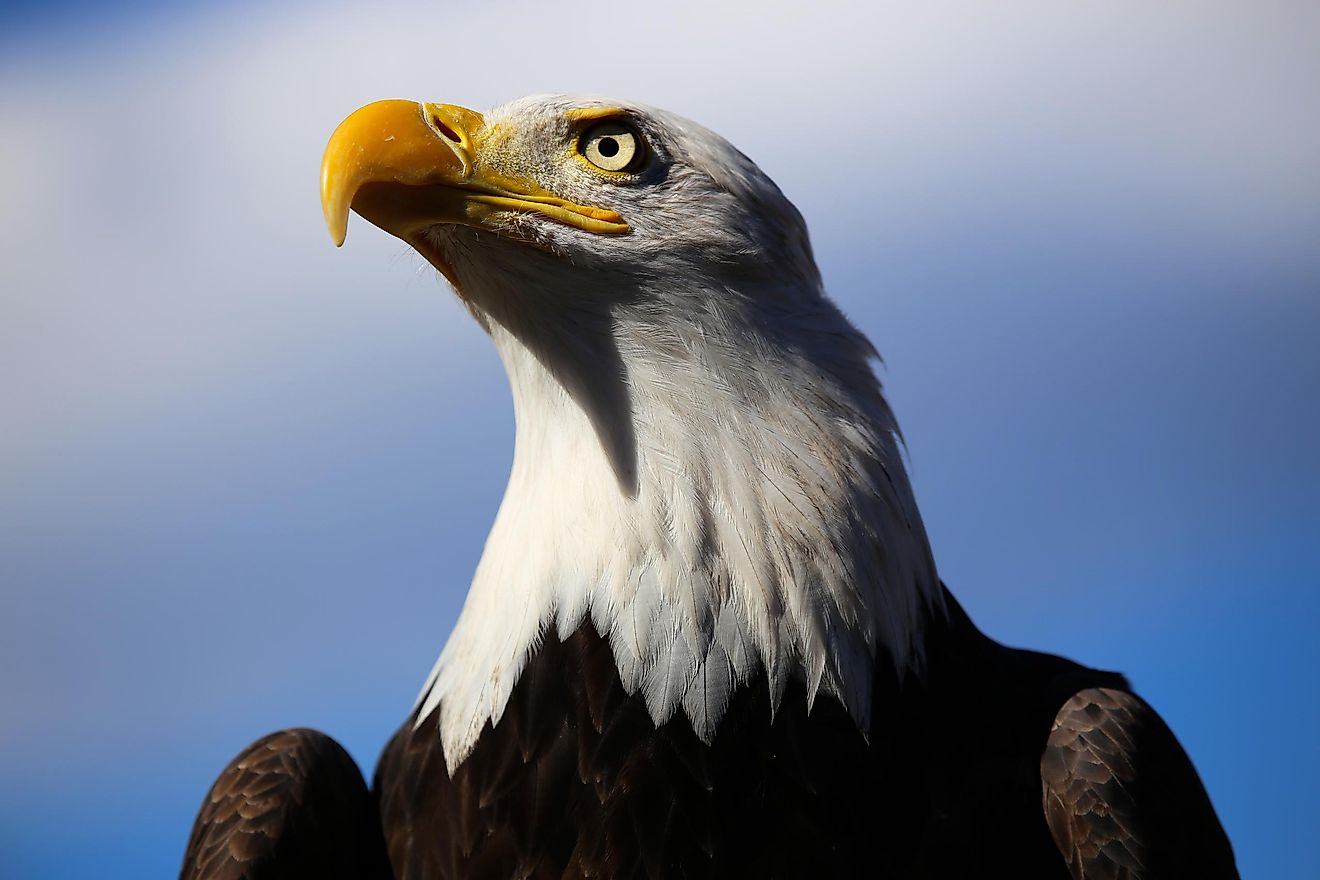
The bald eagle has been the United States' national symbol since 1782. Its body length is 33.8 to 43 inches (86 to 109 cm), and it has a wingspan of 6 to 8 feet (1.8 to 2.4 m). A bald eagle's weight is between 6.5 and 14 pounds (3 to 6.3 kg). When mature, this bird has a white head and tail, a dark brown body and wings, and its legs and bill are bright yellow.
A Bald eagle's choice habitat is near waterbodies, coasts, and lakes where fish are found in plenty, although it will eat small mammals as well. Alaska, Florida, Michigan, and California are places where bald eagles are seen with the most regularity in the United States, and they can also be seen in Canada. Though the eagle’s primary diet is comprised by fresh fish, it scavenges for carrion (decaying flesh of dead animals), and steals other animals’ kills. This scavenging trait led Benjamin Franklin to argue against it being an American national symbol, himself preferring the turkey to serve in that same role.
A bald eagle reaches sexual maturity at 4 to 5 years, just about the time they grow adult plumage. In the wild, it can live on average up to 28 years. A ban on the poisonous DDT pesticide in 1972, which was found in fish the birds ate and weakened their eggshells, resulted in an explosion of bald eagle populations across the US, and as a result it is no longer an endangered bird today.











